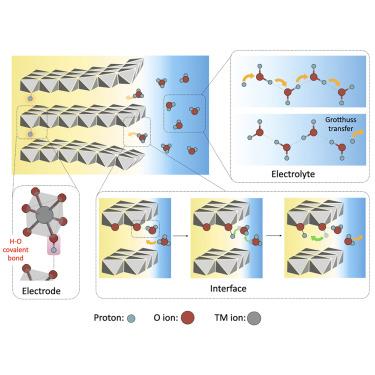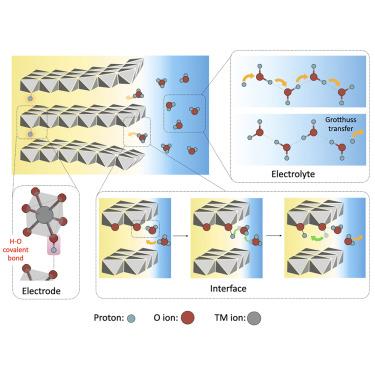质子在水电池中的储存和转移
IF 17.5
1区 材料科学
Q1 MATERIALS SCIENCE, MULTIDISCIPLINARY
引用次数: 0
摘要
水电池具有安全性高、容量大、成本低等优点,是一种很有前途的储能设备。最近的研究表明,由于水中氢键独特的质子转移模式,即使在非酸性环境中,水电池中也有重要的质子参与。本文综述了固体电极中的质子存储,并从概念见解到实际例子概括了质子转移对水电池的影响。介绍了质子作为载流子的专用存储方式,并提出了电极材料选择的原则。然后,讨论了两种不同的质子转移机制,并分析了提高水电池性能的策略。这些策略包括加强电极材料中的质子转移以获得更高的容量和更快的速率,阻止电解质和界面中的质子转移以减少副反应并扩大电化学稳定性窗口。通过详细的案例说明了不同组件之间质子调谐策略的矛盾。本文综述了摇椅式水电池中质子存储和转移的一般现象和挑战,旨在为未来质子在储能系统中的设计和利用提供信息。本文章由计算机程序翻译,如有差异,请以英文原文为准。


Proton storage and transfer in aqueous batteries
Aqueous batteries are promising energy-storage devices due to their high safety, large capacity, and low cost. Recent studies have revealed significant proton involvement in aqueous batteries, even in non-acidic environments, attributed to the unique proton-transfer mode via hydrogen bonds in water. This review summarizes proton storage in solid electrodes and generalizes the impact of proton transfer on aqueous batteries from conceptual insights to practical examples. The specialized storage mode for protons as charge carriers is introduced, and the principles for electrode-material selection are proposed. Then, two distinct proton-transfer mechanisms are discussed, and the strategies to enhance aqueous-battery performance are analyzed. These strategies include reinforcing proton transfer in electrode materials for higher capacity and faster rates and impeding proton transfer in electrolytes and interfaces to reduce side reactions and expand the electrochemical stability window. Contradictions in proton-tuning strategies across different components are illustrated through detailed cases. This review addresses the general phenomena and challenges related to proton storage and transfer in rocking-chair-type aqueous batteries, aiming to inform the future design and utilization of protons in energy-storage systems.
求助全文
通过发布文献求助,成功后即可免费获取论文全文。
去求助
来源期刊

Matter
MATERIALS SCIENCE, MULTIDISCIPLINARY-
CiteScore
26.30
自引率
2.60%
发文量
367
期刊介绍:
Matter, a monthly journal affiliated with Cell, spans the broad field of materials science from nano to macro levels,covering fundamentals to applications. Embracing groundbreaking technologies,it includes full-length research articles,reviews, perspectives,previews, opinions, personnel stories, and general editorial content.
Matter aims to be the primary resource for researchers in academia and industry, inspiring the next generation of materials scientists.
 求助内容:
求助内容: 应助结果提醒方式:
应助结果提醒方式:


